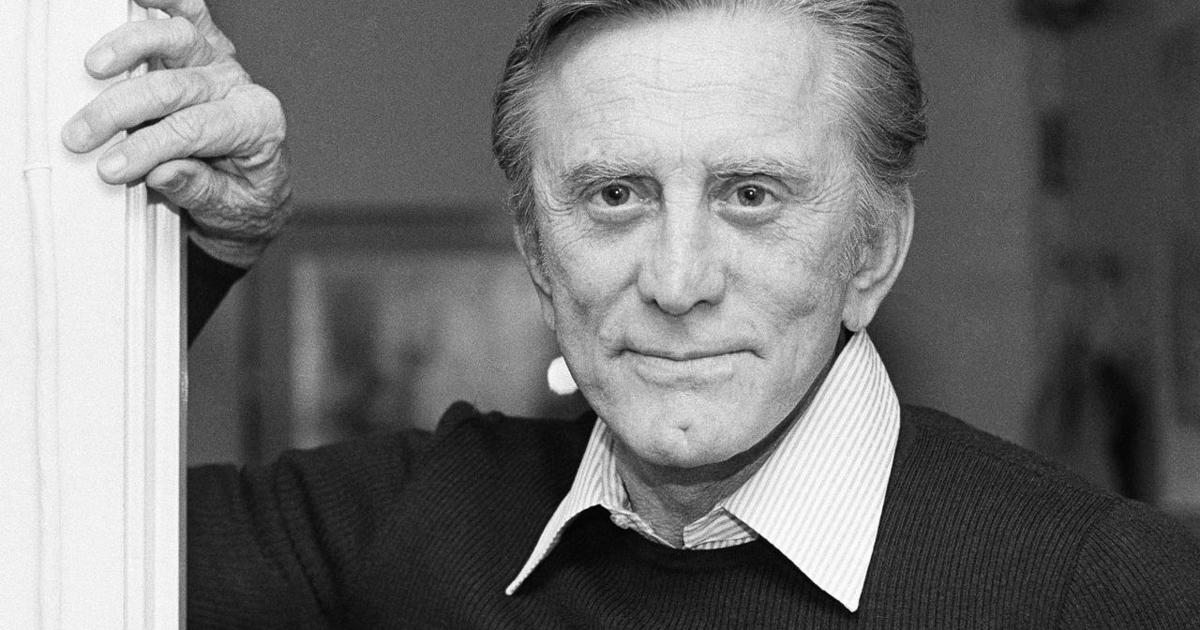
He was a rugged and forceful actor known for performing with an arresting physicality, determination, courage and charm. He would on the rare occasion dip into comedy, but most of the roles played by Kirk Douglas (December 9, 1916-February 5, 2020) were characters grappling with matters of injustice, sometimes journeying into a moral darkness that the son of impoverished Russian immigrants transformed into revealing portrayals of men tasked with great challenges, or struggling to overcome impossible odds and in defeat finding a path to grace. Years before Hollywood celebrated anti-heroes played by Robert De Niro, Al Pacino and Clint Eastwood, Douglas made heroic failures like Spartacus, Vincent Van Gogh or Colonel Dax true icons of cinema.
He was born Issur Danielovitch, but performed on Broadway under the stage name Kirk Douglas in the 1940s, and after serving briefly in the Navy in World War II, he received a key Hollywood break when an old drama school friend from New York, Lauren Bacall, recommended him for “The Strange Love of Martha Ivers,” starring Barbara Stanwyck. It was his first movie role, followed by “Mourning Becomes Electra,” “Out of the Past” and “A Letter to Three Wives,” before his breakout performance as boxer “Midge” Kelly in “Champion” (pictured), for which he received the first of three Academy Award nominations for Best Actor.
Douglas would go on to star in such classics as “Young Man With a Horn” (opposite Bacall), “Ace in the Hole,” “Detective Story,” “The Bad and the Beautiful,” “20,000 Leagues Under the Sea,” “Gunfight at the O.K. Corral,” “The Vikings,” “Lonely Are the Brave,” “Seven Days in May,” “In Harm’s Way,” and “Cast a Giant Shadow,” among others. He started his own company, Bryna Productions, in 1955, and even directed two of his later films.
But three movies in particular fixed Douglas – who lived to the remarkable age of 103 – as an immortal star in the Hollywood firmament: “Lust for Life” (1956), in which he portrayed the tortured Dutch artist Van Gogh; the anti-war drama “Paths of Glory” (1957), directed by Stanley Kubrick, as a World War I colonel who refused to lead his troops into a suicidal assault; and “Spartacus” (1960), also directed by Kubrick, in which he played the leader of a slave revolt against the Roman Empire.
As a producer of “Spartacus,” Douglas – who’d been forced to sign a loyalty oath in order to win the role of Van Gogh – struck a blow to the Hollywood blacklist by acknowledging in the credits the screenplay’s authorship by Dalton Trumbo, a blacklisted writer who’d been forced to write under a pseudonym. (Otto Preminger similarly announced Trumbo’s name would appear on the credits for “Exodus,” released later in 1960.)
“Everybody advised me not to do it – ‘You won’t be able to work in this town again’ and all of that. But I was young enough to say, ‘To hell with it,'” Douglas said of breaking the blacklist in a 2011 interview with The Associated Press. “I think if I was much older, I would have been too conservative: ‘Why should I stick my neck out?'”
He returned to Broadway in 1963 to star in a stage adaptation of Ken Kesey’s novel, “One Flew Over the Cuckoo’s Nest.” He tried for years and failed to make a movie adaptation; more than a decade later, Douglas’ son, Michael (an actor starring in TV’s “The Streets of San Francisco”), produced a film version starring Jack Nicholson that went on to win Five Oscars, including Best Picture. “My father has played up his disappointment with that pretty good,” Michael later told Vanity Fair. “I have to remind him, I shared part of my producing back-end (credit) with him, so he ended up making more money off that movie than he had in any other picture.”
“And I would gladly give back every cent, if I could have played that role,” Kirk said.
In later years, interspersed with roles in “The Fury,” “The Final Countdown,” “The Man From Snowy River,” “Tough Guys,” and the TV movies “Victory at Entebbe” and “Amos,” Douglas became a prolific writer, with the autobiography “The Ragman’s Son”; novels such as “Dance With the Devil,” “The Gift” and “Last Tango in Brooklyn”; and “My Stroke of Luck,” a memoir of his recovery from a debilitating stroke in 1995 that he refused to allow to end his career.
Douglas received an honorary Oscar in 1996. He also received a Presidential Medal of Freedom, and a lifetime achievement award from the American Film Institute.
For years, Douglas had a reputation as someone who was difficult to work with. In 1992, “60 Minutes” correspondent Mike Wallace asked him, why? “It shows you what a good actor I am, because I really am the sweetest!” Douglas replied.

